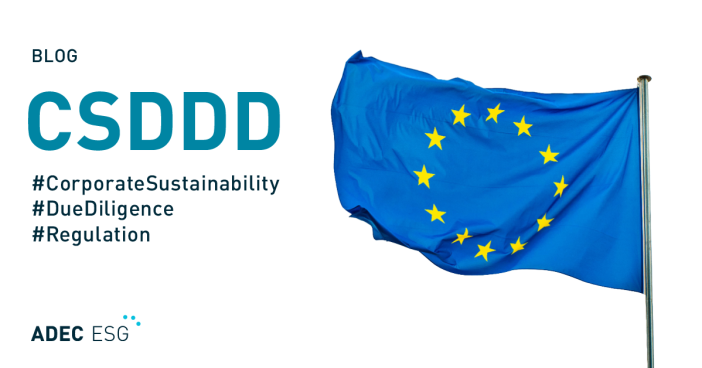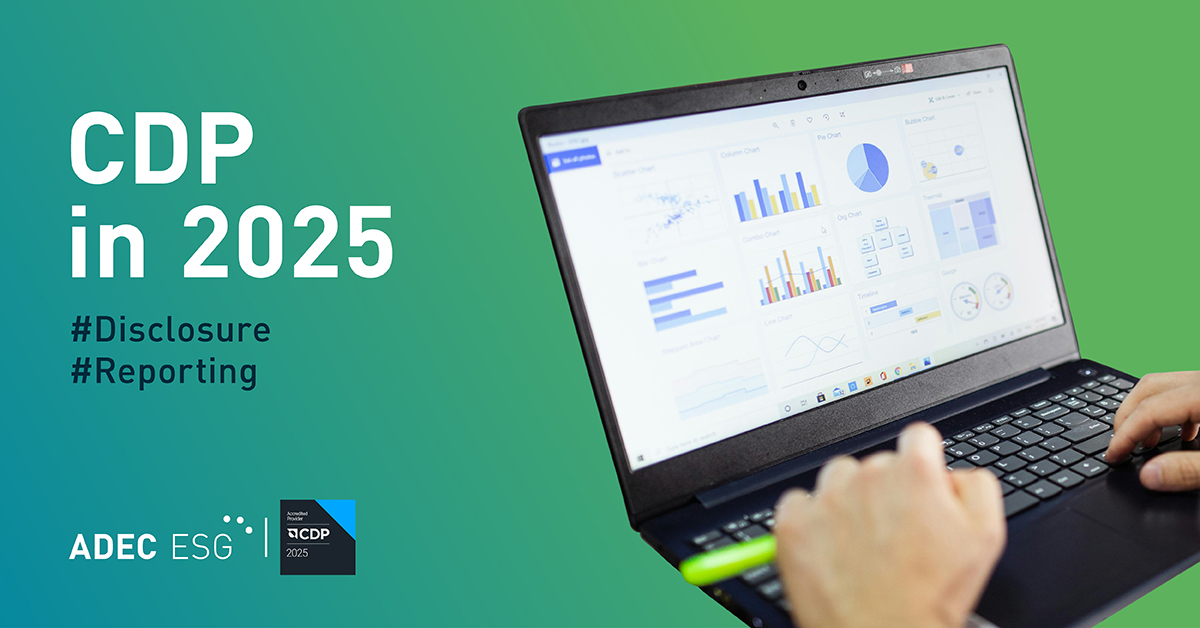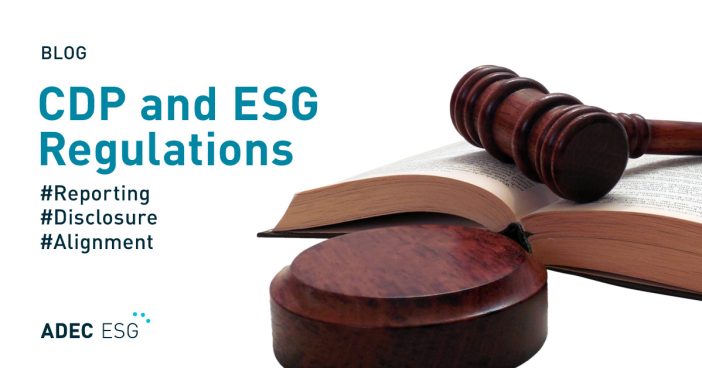On May 24, 2024 the Council of the European Union approved the CSDDD, the Corporate Sustainability Due Diligence Directive. According to the EU Parliament, the aim of this directive is “to foster sustainable and responsible corporate behaviour in companies’ operations and across their global value chains.” The new due diligence requirements apply not only to the direct actions of a company but also to their subsidiaries and chain of activities. Thus, a U.S. company that conducts a certain level of business in the EU could become liable for the actions of its business partners.
Below, we’ll discuss:
- CSDDD basics and terminology
- Due diligence requirements
- Who will be subject to the CSDDD
- Rollout timeline
- Enforcement
- Potential impacts on business—how might the CSDDD affect your company?
CSDDD background
Companies are responsible for identifying and addressing potential and actual adverse human rights and environmental impacts in the company’s own operations, their subsidiaries, and—where related to their value chain—those of their business partners. The due diligence directive lays down rules on obligations for large companies regarding actual and potential adverse impacts on the environment and human rights for their business chain of activities. This includes upstream business partners of the company and partially includes downstream activities, such as distribution or recycling.
Defining “chain of activities”
The final text of the CSDDD provides a specific definition for what falls under “chain of activities.” Separate from the broader term “value chain,” which had been used in previous drafts, this classification covers upstream and downstream activities and specifically refers to:
- the activities of upstream business partners related to the production of goods or provision of services by the company, including design, extraction, sourcing, manufacture, transport, storage and supply of raw materials, or development of the product or service
- the activities of downstream business partners related to the distribution, transport, or storage of products, where the business partner carries out those activities for the company or on their behalf (CSDDD FAQ)
Alignment with international standards
The Directive sets out an obligation for large companies to adopt and put into effect, through best efforts, a transition plan for climate change mitigation aligned with the 2050 climate neutrality objective of the Paris Agreement as well as intermediate targets under the European Climate Law. The CSDDD seeks to mandate companies’ compliance with existing international standards on responsible business conduct (RBC), namely:
- the UN Guiding Principles on Business and Human Rights, which recognize the responsibility of companies to exercise human rights due diligence (HRDD), and
- the Organisation for Economic Co-operation and Development Guidelines for Multinational Enterprises, which recognize the concept of HRDD and extend the application of due diligence to environmental and governance topics.
What are the due diligence requirements?
The CSDDD will require companies to implement due diligence policies as they relate to impacts on human rights and the environment. It introduces core due diligence duties—such as identifying risks and impacts and addressing negative impacts—as well as a handful of additional requirements—such as engaging with stakeholders, disclosing annually, and monitoring and reporting the effectiveness of due diligence measures.
Core due diligence
1. Risk identification and assessment
Companies must continuously identify and assess actual and potential adverse impacts on human rights and the environment throughout their operations, chains of activities, and business relationships. This involves:
- Mapping out entire value chains to highlight areas prone to risks
- Identifying adverse impacts and updating climate transition plans every twelve months
2. Preventive and mitigative measures
Once risks are identified, companies must implement measures to prevent and mitigate these adverse impacts. This includes setting up robust policies, practices, and management systems to address identified risks effectively.
3. Remediation mechanisms
Companies must establish or participate in effective remediation processes to address any adverse impacts that occur. This includes setting up grievance mechanisms to provide affected individuals and communities with access to remedies.
4. Monitoring and reporting
Companies are required to regularly monitor the effectiveness of their due diligence processes and provide annual public reports detailing their findings and actions taken. This transparency is designed to allow stakeholders, including investors, consumers, and regulators, to assess the company’s commitment to sustainability.
Stakeholder engagement
Engaging with stakeholders is a critical component of the CSDDD. Companies must consult with affected parties, including employees, communities, and civil society organizations, to ensure their voices are considered in the due diligence process.
Climate transition plans
The Directive requires companies to adopt a climate transition plan which aims to ensure, through best efforts, that the business model and strategy of the company are compatible with:
- The transition to a sustainable economy
- Limiting global warming to 1.5°C in line with the Paris Agreement
- The objective of achieving the EU’s intermediate and 2050 climate neutrality targets
The plan should:
- Address the exposure of the company to coal-, oil- and gas-related activities
- Include time-bound targets related to climate change for 2030 and in five-year steps up to 2050 based on conclusive scientific evidence
- Where appropriate, include absolute emission reduction targets for greenhouse gas for scope 1, scope 2, and scope 3 greenhouse gas emissions
Annual disclosure
On their website, companies are required to publish an annual statement on topics covered by the Directive. This does not apply to companies that are already subject to sustainability reporting requirements under the EU Corporate Sustainability Reporting Directive (CSRD). The statement should be published no later than twelve months after the balance sheet date of the statement’s financial year.
Who will be subject to CSDDD rules?
The CSDDD is being rolled out over the next several years, with disclosures due as early as 2027. The rules apply to large EU and non-EU entities, with criteria listed below.
In 2027:
- Disclosures due for financial years commencing on or after 1 January 2028.
- Large EU companies with over 5,000 employees and over 1.5 billion euros annual net worldwide turnover (or ultimate parent companies of such a corporate group).
- Non-EU companies with an annual net turnover in the EU of over 1.5 billion euros (or ultimate parent companies of such a corporate group).
In 2028:
- Disclosures due for financial years commencing on or after 1 January 2029.
- Large EU companies and partnerships with over 3,000 employees and over 900 million euros annual net worldwide turnover (or ultimate parent companies of such a corporate group).
- Non-EU companies with an annual net turnover in the EU of over 900 million euros (or ultimate parent companies of such a corporate group).
In 2029:
- Disclosures marked as due for financial years commencing on or after 1 January 2029, though this appears to be an error and the legislators intended to refer to 1 January 2030
- Large EU limited liability companies and partnerships with over 1,000 employees and over 450 million euros net turnover (or ultimate parent companies of such a corporate group).
- Large non-EU companies (or ultimate parent companies of such a corporate group) with over 450 million euros net turnover.
- The Directive contains provisions to facilitate compliance and limit the burden on companies, both in scope and in the value chain.
Exclusions
Small/medium-sized companies (SMEs): Micro companies and SMEs are not covered by the proposed rules. However, the Directive provides supporting and protective measures for SMEs, which could be indirectly affected as business partners in value chains.
Financial services: Only the upstream but not the downstream part of the chains of activities of the financial services industry will be excluded from the scope of the Directive. However, there is a review clause for additional due diligence obligations “tailored to” regulated financial undertakings and financial services based on a sufficient impact assessment.
How will the new rules be enforced?
Administrative supervision
Member States will designate an authority to supervise and enforce the rules, including through injunctive orders and effective, proportionate, and dissuasive penalties (fines), potentially up to 5% of their global turnover. Companies will be required to carry out meaningful engagement—including a dialogue and consultation—with affected stakeholders, as one of the measures of the due diligence process.
At European level, the Commission will set up a European Network of Supervisory Authorities that will bring together representatives of the national bodies to ensure a coordinated approach.
Civil liability
Member States will ensure that victims receive compensation for damages resulting from an intentional or negligent failure to carry out due diligence.
The Directive establishes a period of five years to bring claims by those concerned by adverse impacts (including trade unions or civil society organizations). It also limits the disclosure of evidence, injunctive measures, and cost of the proceedings for claimants.
Exclusion: Public procurement
Noncompliant companies might also be excluded from public tenders and procurement processes within the EU, as the CSDDD could be qualified as a criterion for the award of public contracts and concessions.
Impact on businesses
The nature of the Directive’s requirements will help companies foster closer relationships with suppliers and business partners as they work to ensure compliance throughout the value chain. The CSDDD also provides clear guidance on risk management and sustainability-related expectations for companies looking to improve their resilience.
Benefits of the CSDDD
The Directive provides a harmonized legal framework for sustainable corporate behavior in the EU. This creates a degree of legal certainty around corporate responsibility and establishes a level playing field for companies that fall under its jurisdiction.
To this end, businesses will be forced to integrate comprehensive due diligence processes into their operations. This includes:
- Conducting regular risk assessments
- Establishing new policies and procedures
- Engaging in continuous monitoring and reporting
The adoption of such a framework also helps improve:
- Awareness of any negative human rights and environmental impacts, allowing companies to strategize and plan around improvement efforts—and fewer liability risks
- Risk management, resilience, and sustainability-related practices by providing clear, standardized guidance
- Protection for human rights and the environment
- Living conditions for those affected by the operations and activity chains of large global companies, in alignment with international guidelines
Potential costs
That said, the CSDDD will also come with associated costs, including:
- The costs of establishing and operating the due diligence process
- Transition costs, including expenditure and investments to adapt a company’s own operations and value chains to comply with the due diligence obligation, if needed
The CSDDD—along with associated regulatory action such as the Corporate Sustainability Reporting Directive (CSRD)—introduces enhanced standards and increases sustainability-related obligations for both EU and non-EU entities. While in-scope companies have been given some time to prepare for these new requirements, the earlier an organization takes action, the better.
ADEC ESG helps organizations like yours every day at every step of the Sustainability Journey. Our team of experienced experts can help you identify new and upcoming regulations that are most pertinent to your company, assess potential impacts from climate change and low-carbon transitions, develop a greenhouse gas emissions inventory, and more. Want to learn more about how we can help? Talk to our team today.




